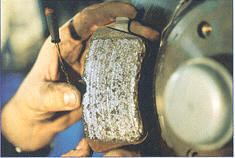See what's happening at Wayne's!
We often hear about auto recalls when they become big news, but recalls happen quite often and are not always publicized. Many cars running around out on the road have recalls that have never been addressed.
For those who bought used vehicles or have moved since a vehicle purchase, they may not get a notice.
How do you find out if there is a recall on your car? Go to Carfax and enter your make and VIN#. If your car is not listed you can check with a dealer or go to National Highway Traffic Safety Administration or NHTSA.
Millions of drivers could be endangered by operating vehicles that have been recalled but have not been repaired, according to an investigation conducted by Edmunds. They found there were at least 2.7 million vehicles listed for sale last year that still were subject to unfulfilled recalls. There are no laws that require a car's owner to notify a potential buyer that the car being sold is the subject of a recall. More about recalls and 14 of the largest.![]()
Ignoring that Check Engine Light
 When the first GM cars with onboard computers and diagnostic capabilities came out in the early 80's, they could recognize a limited amount of problems and could store less than 20 trouble codes. It's not unusual for an average car today to recognize and set 125 codes or more just for the engine and transmission.
When the first GM cars with onboard computers and diagnostic capabilities came out in the early 80's, they could recognize a limited amount of problems and could store less than 20 trouble codes. It's not unusual for an average car today to recognize and set 125 codes or more just for the engine and transmission.
Then there is Anti-lock Brakes, Traction Control, Air Bag, suspension and other systems that have their own codes.
Some of these engine and transmission codes are for problems that usually won't cause problems we notice while driving. We often hear, "that light has been on for years, I don't worry about it anymore" or "Since this is a minor problem, can I continue driving it and not fix it right now?"
Unfortunately you only have one check engine light. If you ignore the light because of a problem that doesn't seem to affect the way the car drives, something else might crop up that will cause big problems and you may not know until it's too late because the light is already on.
Some problems that the light can come on to warn you about can cause poor mileage or be a warning that you may be left by the side of the road soon. Other warnings can be about things that can cause catalytic converter, transmission or engine failure.
![]()
See more Automotive Service and Repair Tips at Wayne's Garage
Share this Page![]()
Many of today's cars have more than 100 million lines of software code running everything from navigation systems to braking systems.
![]()
Wayne's Garage - serving Eugene and Springfield, Oregon car and light truck needs.
Integrity, Quality and Exceptional Service.

333 Q Street
Springfield, Oregon





